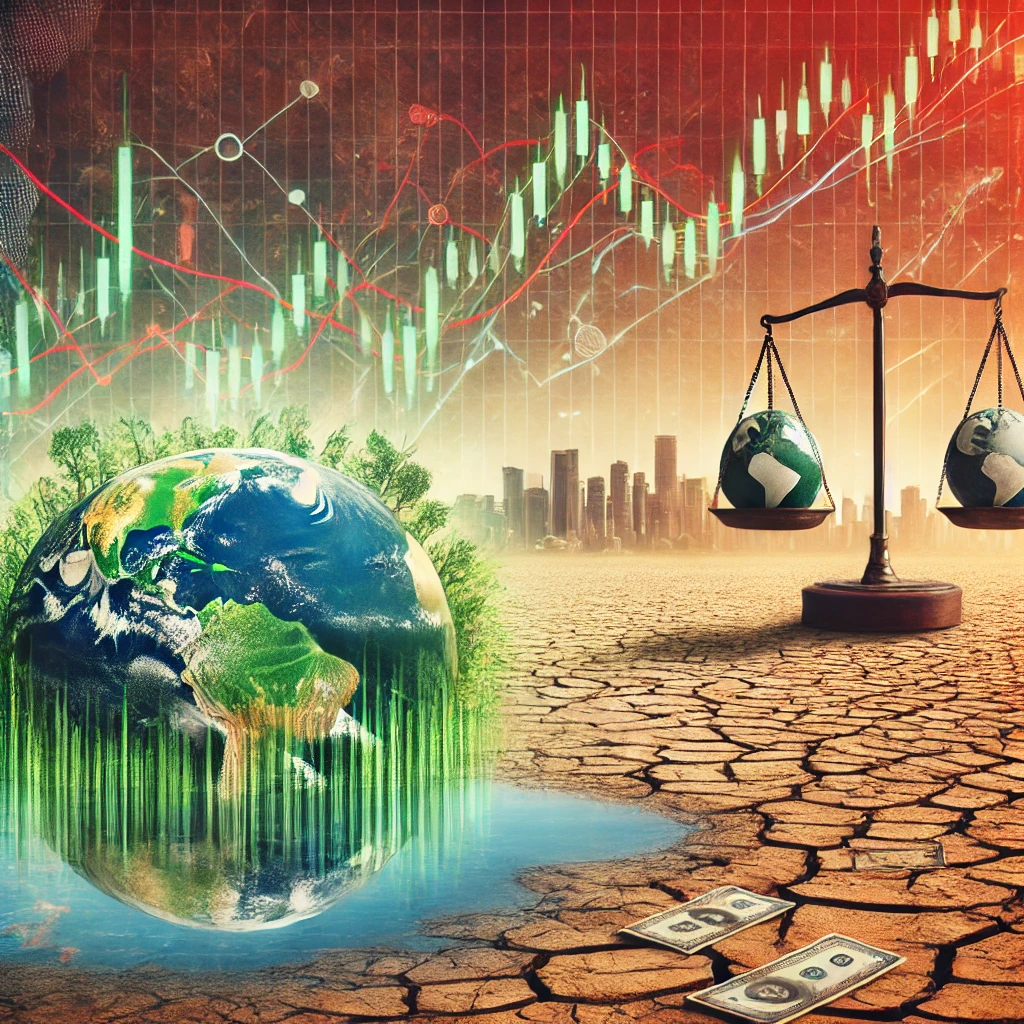Introduction
Climate change is no longer just an environmental issue—it has become a major financial risk affecting economies, businesses, and investors worldwide. Recent studies reveal a strong correlation between climate-related risks and financial market performance, particularly in supply chains and investment portfolios. This has prompted investors and financial institutions to integrate climate risk assessments into their strategies to safeguard long-term profitability.
For India, a country highly vulnerable to climate change, the implications are even more pronounced. With increasing instances of extreme weather events, resource scarcity, and regulatory shifts, climate risk is a crucial factor that investors must consider. This article explores how climate change is reshaping financial risk, its impact on global and Indian markets, and strategies for investors to adapt to the changing economic landscape.
Understanding Climate-Related Financial Risk
What is Climate Financial Risk?
Climate financial risk refers to the potential economic losses arising from the impact of climate change-related factors, such as:
- Physical Risks: Damage to assets and infrastructure due to extreme weather events like floods, droughts, cyclones, and heatwaves.
- Transition Risks: Financial losses due to regulatory changes, shifts in consumer preferences, and technological advancements aimed at reducing carbon emissions.
- Liability Risks: Legal actions against companies and governments for failing to address climate-related issues.
Recent Studies on Climate and Financial Risk
A growing body of research highlights the direct impact of climate risks on investment returns:
- A 2023 MSCI Report found that companies with high carbon footprints faced an average 8-10% decline in valuation due to increasing regulatory pressures and shifting investor preferences.
- The Bank of England’s 2024 Climate Stress Test estimated that if global temperatures rise by 3°C, financial institutions could face losses exceeding $200 billion in the next decade.
- A report by the Reserve Bank of India (RBI) in 2024 emphasized that climate change could reduce India’s GDP by 2.5-4.5% annually by 2050 if proactive measures are not taken.
Climate Risks in Global and Indian Supply Chains
How Climate Change Affects Supply Chains
Climate change disrupts supply chains by increasing production costs, delaying logistics, and damaging infrastructure. Key industries facing supply chain risks include:
- Agriculture: Erratic monsoons and rising temperatures impact crop yields, leading to food inflation and losses for agribusinesses.
- Manufacturing: Extreme weather disrupts factory operations and transportation, affecting industries like textiles and electronics.
- Energy Sector: Dependence on coal and thermal power plants in India makes the sector vulnerable to water shortages and emission regulations.
Case Study: India’s Agricultural Supply Chain
India, one of the world’s largest agricultural producers, faces severe risks from climate change:
- In 2022, unseasonal heatwaves reduced wheat production by nearly 10%, leading to export bans and supply shortages.
- Floods in Maharashtra in 2023 destroyed fruit and vegetable farms, disrupting supply chains and increasing food prices.
- The Indian government has introduced initiatives like the National Adaptation Fund for Climate Change (NAFCC) to help farmers adapt to changing weather patterns.
Investment Risks and Climate Change
How Climate Risks Impact Investment Portfolios
Climate risks affect portfolio returns in multiple ways:
- Stock Market Volatility: Companies with high carbon footprints face reputational damage and declining investor confidence.
- Real Estate Risks: Properties in coastal cities like Mumbai and Chennai are at high risk due to rising sea levels.
- Energy Sector Disruptions: Investors in fossil fuel-based industries face stranded assets as the world shifts to renewable energy.
Indian Perspective: RBI’s Climate Risk Guidelines
The Reserve Bank of India (RBI) has taken proactive steps to integrate climate risk into financial regulations:
- In 2024, the RBI issued climate stress-testing guidelines for banks, requiring them to assess loan risks associated with climate change.
- The Securities and Exchange Board of India (SEBI) now mandates climate risk disclosures for large corporations.
Strategies for Investors to Manage Climate Risk
1. Integrating ESG (Environmental, Social, and Governance) Investments
Investors are increasingly shifting towards ESG-friendly portfolios, which prioritize sustainable and responsible businesses. Key trends include:
- Green Bonds: Investments in projects that support renewable energy, energy efficiency, and climate resilience.
- Sustainable Index Funds: Funds tracking companies with low carbon footprints and ethical governance.
2. Diversifying Investments to Reduce Exposure
To mitigate climate risk, investors should consider:
- Shifting from fossil fuels to renewable energy assets.
- Investing in climate-resilient sectors like technology, healthcare, and water infrastructure.
3. Supporting Climate-Resilient Business Models
Investors should focus on companies adopting climate-friendly practices, such as:
- Corporations with net-zero carbon commitments.
- Businesses integrating AI-driven climate risk analytics into their strategies.
4. Engaging in Climate Advocacy and Shareholder Activism
Institutional investors can demand better climate disclosures and push for sustainable corporate policies through shareholder activism.
Opportunities in India’s Green Economy
Despite the risks, climate change presents major investment opportunities in India:
- Renewable Energy: India aims to achieve 500 GW of renewable energy capacity by 2030, creating significant investment potential.
- Electric Vehicles (EVs): The government’s Faster Adoption and Manufacturing of Electric Vehicles (FAME) scheme is driving EV industry growth.
- Green Hydrogen: India is emerging as a global hub for green hydrogen production, with companies like Reliance and Adani investing heavily in the sector.
Conclusion: Preparing for a Climate-Resilient Financial Future
Climate change is rapidly reshaping the global financial landscape, and investors can no longer afford to ignore its impact. From supply chain disruptions to stock market fluctuations, climate risks are now a fundamental factor in financial decision-making.
For India, the need to integrate climate risk assessment into investment strategies is more pressing than ever. As regulatory frameworks evolve and sustainable investments gain momentum, those who adapt early will not only mitigate risks but also capitalize on the emerging opportunities in the green economy.
By adopting climate-conscious investment strategies, businesses and investors can contribute to a more resilient, sustainable, and profitable future.









+ There are no comments
Add yours